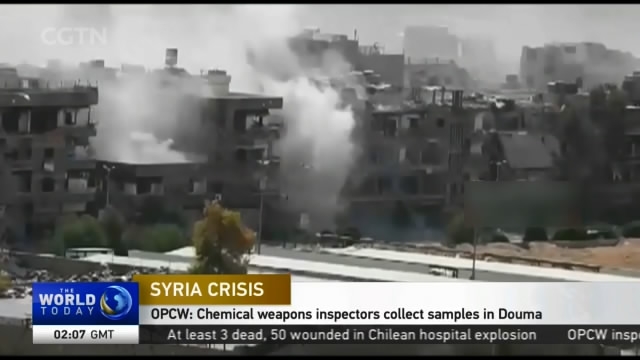
12:39, 22-Apr-2018
Syria Crisis: OPCW: Chemical weapons inspectors collect samples in Douma
02:27

Two weeks after a suspected chemical attack in the Syrian town of Douma, a fact-finding team of inspectors has collected samples. The US, the UK and France, suggested Russia deliberately delayed the visit to destroy possible evidence. Russia blamed the delay on US-led airstrikes. CGTN's Alaa Ebrahim has more from Damascus.
ALAA EBRAHIM DAMASCUS After being in the country for over a week, the international chemical weapons watchdog, the OPCW, says its inspectors have finally been able to enter the town of Douma. The inquiry they're conducting was launched at the invitation of the Syrian government and is expected to determine whether chemical agents were used in an attack that took place on April 7th when Douma was still held by the rebels.
CGTN learned that the inspectors collected soil samples at two sites hit by suspected chemical weapons, in addition to visiting a graveyard where bodies of victims are buried.
In the meantime, rebels continue to leave the countryside surrounding the capital. Syrian state media reported that 32-hundred persons including rebel fighters and their families were expected to leave the town of Ruhayba on Saturday, 60 km northeast of Damascus. Dozens of buses carried fighters from the Army of Islam rebel factions as they headed north.
The rebels have been steadily losing ground around Damascus. The Syrian army is focusing now on areas south of the capital - including the Yarmouk Palestinian refugee camp, and the Al-Hajjar Al-Aswad and Al-Kaddam districts. The three areas are under relentless attack by the Syrian army which says the offensive will go on until all the militants are cleared.
These districts are controlled by a coalition of ISIL and Al-Qaeda militants in addition to smaller rebel factions. Where these last fighters will be evacuated to remains unclear but Syrian military officials say they're confident that by the end of next week the Syrian capital and its countryside will be rebel free for the first time since 2012. AEB, CGTN, Damascus.

SITEMAP
Copyright © 2018 CGTN. Beijing ICP prepared NO.16065310-3
Copyright © 2018 CGTN. Beijing ICP prepared NO.16065310-3